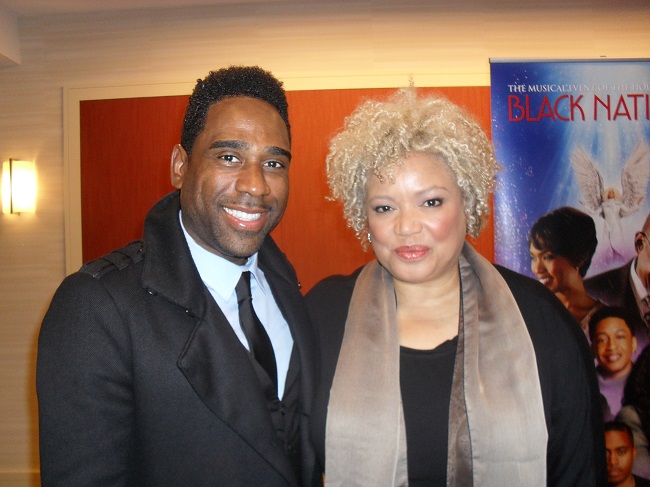Photo Credit: RayCornelius.com
Written by | Ray Cornelius
Acclaimed film director and screenwriter Kasi Lemmons’ is back with a new spin on an old Langston Hughes’ classic play Black Nativity. This contemporary version of the Nativity story stars Oscar-winning actress Jennifer Hudson as Naima, a single mother struggling to make ends meet while raising her teenage son Langston, played by Jacob Latimore. She is forced to send Langston to his grandparents’ home in Harlem, NY for Christmas where he learns the true meaning of the holiday season. Hudson leads an all-star line-up that includes Forest Whitaker, Angela Bassett, Tyrese Gibson, Nas, Mary J. Blige and R&B newcomer Luke James.
Mostly known for her acclaimed 1997 drama, Eve’s Bayou starring Lynn Whitfield and Samuel L. Jackson, Lemmons said she was compelled to bring the genius of Hughes’ work to a new modern audience. Although Black Nativity is perceived to be a faith-based film (Bishop T.D. Jakes is one of the executive producers), Lemmons said that it’s more about the complexities of family and how the one decision—-big or small—can change the entire course of one’s history.
Lemmons was recently honored for her body work at the Bronze Lens Film Festival in Atlanta. Black Nativity was the festival’s opening night film. During her visit I sat down with Lemmons to discuss Nativity and her upcoming projects. Although, she wouldn’t give any details, Lemmons said Georgia could be the site of a future film. She has already scouted Atlanta for possible locations.
RC: What made you decide to direct this film? Were you on board after the first meeting?
KL: There was no back and forth at all. As soon as Celine Rattray, one of the producers, asked me if was interested in doing Black Nativity, I was like, “That’s it…look no further…I’m your person. I don’t even want to hear of any competition…meet no other directors. I am the one.” Yeah I wanted to do it instantly.
RC: Reportedly, you’ve said that you wrote the screenplay with Jennifer Hudson in mind, explain?
KL: Usually I write characters and I don’t think of actors but in the case of Naima, I knew I wanted a real singer. I knew I wanted her to be both fragile and strong and young and just had Jennifer [Hudson] in mind. It’s unusual for me to write with an actor in mind or to have an actress in mind but I also did the same thing with Tyrese. He had worked with my husband and I just knew that character was for him. Forest [Whitaker] and Angela [Bassett] were kind of like dream people I had in my head. This is one of those times when I really did think about who might play the parts.
RC: You recruited Raphael Saadiq to score the film’s soundtrack. What was it like working with him?
KL: I had written lyrics into the script and I automatically started thinking about songs even though I’m not a songwriter. (LOL) So I knew I needed a partner and I woke up one night in bed and was like Raphael Saadiq. I love him and we had a great time. For me it was a real gift to work around and closely with him because he’s a genius and a visionary. To get to work with him was really different and it was wonderful bringing all of those actors and artists into the studio.
RC: You also teamed up with Bishop T.D. Jakes, what was it like working with him?
KL: Well we just started working together very recently, even though he had been involved with the film since the script stage but we weren’t working together. I mean, he was over there building awareness for it and I was off making the film. So we’ve only really met recently. But we have great chemistry and we get along really well. I’m very impressed by him and very grateful for his partnership in this. We really wanted him to take a look at it and see if this was something he was interested in and befitting of his brand. He’s been very supportive.
RC: How did directing the film and writing the screenplay affect your faith?
KL: It’s a very complicated process. I was like two years into writing it seriously when my sister got ill and she died in summer 2011. I think there was some feeling from the people that were involved in it and the people from the studio that I might not be able to continue because it was such a huge blow. But I found myself working out my grief in the making of the film and even in finishing the script. It became in some ways about my sister. It also became in some ways about how you keep the faith. I can’t point my finger on it, but in a way it became my own quest of faith and how to keep having it and it became very important to me. My feelings about faith are all in the film.
RC: What do you want audiences to walk away with from the movie?
KL: Families are very complicated and messy and I wanted to present a very real contemporary family with contemporary issues and yet with one small gesture, you can affect change in a very big way. Langston’s [Jacob Latimore] journey goes from feeling powerless to really having the power in this situation and realizing that he has an opportunity to create a miracle or be part of one right in his own family.
Black Nativity opens nationwide in theaters November 27.


